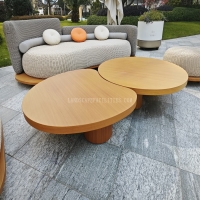Welcome to the website for landscape facilities products and knowledge.
What are the weight-bearing capacities of different landscape bar counter materials?
When designing an outdoor kitchen or entertainment area, selecting the right material for your landscape bar counter is crucial, not just for aesthetics but for structural integrity. The weight-bearing capacity—how much load a material can support without cracking or deforming—varies significantly across different options. This is vital for supporting heavy appliances, sinks, or even people sitting on the counter. Here’s a breakdown of the common materials and their typical weight-bearing capabilities.
Granite is a top contender for heavy-duty use. As a natural stone, it boasts an impressive compressive strength, often ranging between 7,000 and 20,000 psi (pounds per square inch). This means a standard 3cm thick slab can easily support the weight of multiple heavy kitchen appliances and people without issue. Its density and hardness make it highly resistant to cracking under pressure, though proper sub-structure support is still essential.
Concrete counters, especially when reinforced with rebar or fiber, are exceptionally strong. Their weight-bearing capacity is immense, typically exceeding 4,000 psi in compressive strength. Poured-in-place concrete can be engineered to bear tremendous loads, making it ideal for large, monolithic countertops. However, its strength is highly dependent on the mix design, curing process, and quality of installation. Pre-cast concrete slabs may have slightly lower thresholds but are still remarkably robust.
Engineered Quartz is a popular man-made alternative. While incredibly durable against scratches and stains, its weight-bearing capacity is generally high but slightly less than natural granite, often in the range of 6,000 to 12,000 psi. It is a non-porous material made from crushed quartz and resin, which provides excellent overall strength for normal bar counter use, including supporting sinks and bar stools.
Stainless Steel offers a different kind of strength. It is not measured in psi like stone but in its load-bearing capacity as a structure. Typically, 14-gauge or 12-gauge steel is used for counters, providing high tensile strength and the ability to support heavy loads without bending or warping. It is often used in professional kitchens for its ability to hold heavy equipment, though it can dent under extreme point loads.
Wood, particularly hardwoods like Ipe or Teak, has a lower weight-bearing capacity compared to stone or metal. Its strength is highly directional (stronger along the grain) and can compress over time. A thick hardwood countertop might have a modulus of rupture around 10,000 psi, but it is more susceptible to damage from point loads or heavy impacts. It requires a very sturdy substructure for support and is better for lighter-duty applications.
Finally, Tile counters have a capacity that depends almost entirely on their substrate. The tiles themselves are brittle, but when properly installed on a strong cement board or plywood base, the overall structure can be quite strong. The grout lines, however, are potential weak points for cracking under concentrated heavy weight.
In conclusion, for maximum weight-bearing, granite and reinforced concrete are the strongest choices. Quartz and stainless steel offer excellent strength for most applications, while wood and tile require more careful consideration and support. Always consult with a professional to ensure your substructure is designed to match the inherent strength of your chosen countertop material.
Related search:

Recommendation
Elliptical metal outdoor table with nested design, resembling wood grain, round table